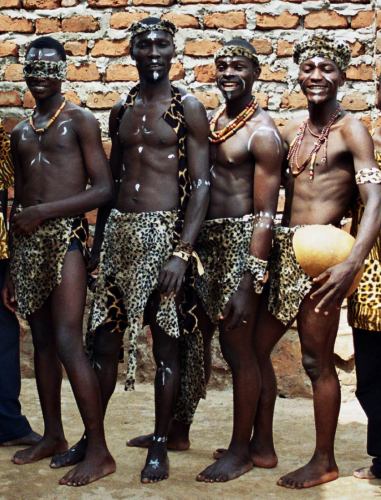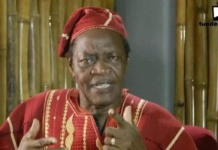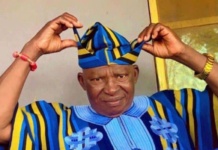
The Acholi are a Luo people, who came to northern Uganda from the area now known as Bahr el Ghazal in southern Sudan. Starting in the late seventeenth century, a new sociopolitical order developed among the Luo of northern Uganda, mainly characterized by the formation of chiefdoms headed by Rwodi. By the mid-nineteenth century, about sixty small chiefdoms existed in eastern Acholiland. During the second half of the nineteenth century Arabic-speaking traders from the north started to call them Shooli, a term which transformed into ‘Acholi.’ During Uganda’s colonial period, the British encouraged political and economic development in the south of the country, in particular among the Baganda. In contrast, the Acholi and other northern ethnic groups supplied much of the national manual labour and came to comprise a majority of the military, creating what some have called a “military ethnocracy.” This reached its height with the coup d’état of Acholi General Tito Okello and came to a crashing end with the defeat of Okello and the Acholi-dominated army by the National Resistance Army led by now-President Yoweri Museveni. The Acholi of northern Uganda today constitute over a million of the displaced African refugees. The surviving Acholi now number only about a million and a half. Hundreds of thousands have been massacred, maimed and displaced by their own government’s troops and by rebels of the Lord’s Resistance Army. There is serious genocide being committed against the Acholi people with hundreds dying every day. Children are abducted, women raped, schools closed while the population starves. Today, the impoverished Acholi people suffer under the most inhumane conditions. The Acholi are known to the outside world mainly because of the insurgency of the Lord’s Resistance Army led by Joseph Kony.
The Acholi language is a Western Nilotic language, classified as Luo, and is mutually intelligible with Lango and other Luo languages. Acholi (also Acoli, Akoli, Acooli, Atscholi, Shuli, Gang, Lwoo, Lwo, Log Acoli, Dok Acoli) is a language primarily spoken by the Acholi people in the districts of Gulu, Kitgum and Pader, a region known as Acholiland in northern Uganda. Acholi is also spoken in the southern part of the Opari District of Sudan. As of 1996 there were reported approximately 773,800 Acholi speakers in the world. However, this has gradually grown to over 800,000. Song of Lawino and its sequel, Song of Ocol, well known African literature, were written in Acholi by Okot p’Bitek. Acholi, Alur and Lango have between 84% and 90% of their vocabulary in common and thus are mutually intelligible.
Most Acholi are Protestant, Catholic and, in lesser numbers, Muslim. Nevertheless, the traditional belief in guardian and ancestor spirits remains strong, though it is often described in Christian or Islamic terms. The Acholi believed in a supreme being called Jok and in another god, Lubanga, who was the cause of evil. The Acholi also worshipped the spirits of the dead and believed that they helped the surviving members of the family if they were treated well.
Traditionally they lived in circular huts with a high peak, furnished with a mud sleeping-platform, jars of grain and a sunken fireplace. The walls are daubed with mud and decorated with geometrical or conventional designs in red, white or grey. They were skilled hunters, using nets and spears, and kept goats, sheep and cattle. In war they used spears and long, narrow shields of giraffe or ox hide. Family life in Acholi has traditionally always been stable. Once a man and a woman are married and have children, they take pride in remaining faithful to each other. Children were taught to respect their parents and the homestead was the place where you found security, affection and a healthy environment to lead a simple, happy life. The backbone of the Acholi culture was the informal education given in the evening at the fireplace, called “wang oo” in Luo. This precious way of passing on a culture of centuries is gone. There is pre-primary or nursery education in Uganda but very few children attend because many parents cannot afford the cost. There is no direct government control or provision at the pre-school level. There is also a limited number of teachers available especially in villages and very rural areas. Nursery schooling is therefore not seen as being very important.
For most Acholi people at present, food is largely a matter of survival. Major food crops in the north include ground cassava, millet, sorghum and simsim. The Cuisine of Uganda consists of traditional cooking with English, Arab and Asian, especially Indian, influences. Main dishes are usually centred on a sauce or stew of groundnuts, beans or meat. The starch traditionally comes from ugali (maize meal) or matoke (boiled and mashed green banana), in the South, or an ugali made from pear millet in the North. Cassava, yam and African sweet potato are also eaten. Chicken, fish (usually fresh, but there is also a dried variety reconstituted for stewing), beef, goat and mutton are all commonly eaten. Among the rural poor there would have to be a good reason for slaughtering a large animal such as a goat or a cow and nyama, (Swahili word for “meat”) would not be eaten every day. Various leafy greens are grown in Uganda.








